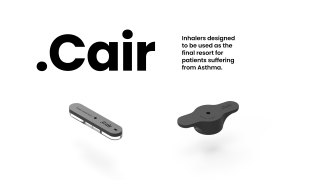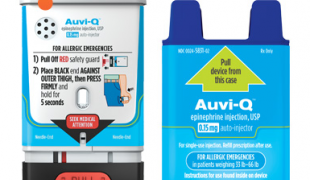- 5287
- 432
- 12
- 11
- 0
- Help Ukraine
About the solution
The product concept and vision were triggered while observing a very close friend, Matt, struggling for air and needing to use his inhaler to breathe, which is a daily task most people take for granted.
When Matt pulled his inhaler from a pocket his body language changed, he shrank, a shoulder dropped, and he withdrew from his environment, and after 2 quick puffs, he awkwardly and hastily shoved the inhaler in his pocket, returned to normal, and breathed a sigh of relief.
Nicholas had realized Matt was hyper-aware of his Asthma and the inhalers stigmas, and how people might perceive him as weak or disabled, it embarrassed him, and the stigma was affecting him emotionally and physically. It turns out Matt is not alone, as there are over 340 million asthmatics, globally.
At that moment a light bulb went off and Nicholas imagined an inhaler, that had today’s technology integrated into it, it was modern, and the appearance was like a pair of reading glasses or a watch, it would be patient-centric, appealing, personalized, and data-driven.
Did you know the stigma associated with Asthma, is recognized as one of the major barriers to health-seeking, and why should you feel stigmatized for using an inhaler for a non-curable disease when you are confident and stylish using your prescribed, personalized, reading glasses?
Further, non-adherence to medication plans can be as low as 30%, the devices are used incorrectly up to 94% of the time, and the medication reaching the lungs as low as 10-20%.
Simply put, people don’t like using inhalers, they are hard to use, and the disease is stigmatized, all of which can contribute to uncontrolled asthma, which can lead to life-threatening attacks and huge treatment costs for healthcare systems.
Beyond this, inhalers are ecologically unsustainable, and an astounding 1.4 billion single-use inhalers produce approximately 140,000kgs of plastic pollution every year, and the current propellants have high global warming potential.
The next steps for the project are to achieve “proof-of-principles” which includes detailed patient and device studies, Circularity Life-cycle-Analysis, hardware and software framework requirements, UX / UI, mHealth device connectivity, Biomechanics mathematics, Machine Learning strategy, Device Security, and furthering HEOR, cost-effective analysis, market access, compliance, regulatory, and reimbursement strategies for key geographies.
This solution shall not include mention to the use of drugs, chemicals or biologicals (including food); invasive devices; offensive, commercial or inherently dangerous content. This solution was not medically validated. Proceed with caution! If you have any doubts, please consult with a health professional.
-
-
348
-
0
-
3456

Cair, emergency asthma inhalers
VENTILATION
CAREGIVING
Asthma
3d Printed
Fatigue
Difficulty breathing deeply
Rapid breathing (tachypnea)
Shortness of breath
Improving respiratory function
Enhancing health literacy
Promoting self-management
Preventing (Vaccination, Protection, Falls, Research/Mapping)
Raise awareness
Caregiving Support
General and Family Medicine
Infectious Diseases
Internal Medicine
Pediatrics
Pneumology
India
-
-
-
702
-
0
-
10081

Twins create Auvi Q to help themselves fighting life threatening allergies
CAREGIVING
VENTILATION
Allergic reaction (food
drugs
material/chemicals)
Assistive Daily Life Device (to help ADL)
Treatment/Surgical device
Promoting self-management
Manage Medication
Preserving Organ Function
To improve Treatment/Therapy
Preventing (Vaccination, Protection, Falls, Research/Mapping)
Raise awareness
Caregiving Support
Dermatology
General and Family Medicine
Intensive Care Medicine
Pediatrics
United States
-
-
-
544
-
0
-
7375

Tuberculosis patient develops locker to deliver meds so patients can avoid long waiting times
CAREGIVING
HIV Infection
Assistive Technology access
Enhancing health literacy
Promoting self-management
Manage Medication
Preventing (Vaccination, Protection, Falls, Research/Mapping)
Raise awareness
Caregiving Support
General and Family Medicine
Infectious Diseases
Internal Medicine
Pediatrics
Tropical Medicine
South Africa
-
 en
en